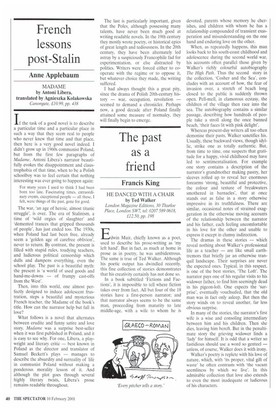The past as a friend
Francis King
HE DANCED WITH A CHAIR by Ted Walker
London Magazine Editions, 30 Thurloe Place, London SW7, tel. 0207 589 0618, £12.50, pp. 198
Edwin Muir, chiefly known as a poet, used to describe his prose-writing as 'my left hand'. But in fact, as much at home in prose as in poetry, he was ambidextrous. The same is true of Ted Walker, Although his poetic output has dwindled recently, this fine collection of stories demonstrates that his creativity certainly has not done so.
In a book subtitled 'Fictions and Factions', it is impossible to tell where fiction takes over from fact. All but four of the 18 stories have a first-person narrator; and that narrator always seems to be the same man, proceeding from maturity to late middle-age, with a wife to whom he is devoted, devoted, parents whose memory he cherishes, and children with whom he has a relationship compounded of transient exasperation and misunderstanding on the one hand and enduring love on the other.
When, as repeatedly happens, this man looks back to his south-coast childhood and adolescence during the second world war, his accounts often parallel those given by Walker's richly colourful autobiography The High Path. Thus the second story in the collection, 'Cosher and the Sea', concludes with an account of how, the fear of invasion over, a stretch of beach long closed to the public is suddenly thrown open. Pell-mell, in clamorous ecstasy, the children of the village then race into the sea. The autobiography contains a similar passage, describing how hundreds of people take a stroll along the once banned beach, 'their faces lit with pink delight'.
Whereas present-day writers all too often demonise their pasts, Walker sanctifies his. Usually, these backward views, though idyllic, strike one as totally authentic. But, from time to time, one suspects that gratitude for a happy, vivid childhood may have led to sentimentalisation. For example one story contains a description of the narrator's grandmother making pastry, her sleeves rolled up to reveal her enormous forearms 'strong, beautiful and protective, the colour and texture of breakwaters smothered in barnacles', that at once stands out as false in a story otherwise impressive in its truthfulness. There are similar, occasional notes of strained exaggeration in the otherwise moving accounts of the relationship between the narrator and his father, each feeling uncomfortable in his love for the other and unable to express it except in clumsy indirection.
• The dramas in these stories — which reveal nothing about Walker's professional life as a teacher — are like small earthtremors that briefly jar an otherwise tranquil landscape. Their surprises are never the expected ones. Typical, in this respect, is one of the best stories, The Loft'. The narrator pays one of his regular visits to his widower father, to find him seemingly dead in his pigeon-loft. One expects the 'surprise', eventually vouchsafed, that the old man was in fact only asleep. But then the story winds on to reveal another, far less obvious surprise.
In many of the stories, the narrator's first wife is a wise and consoling intermediary between him and his children. Then she dies, leaving him bereft. But in the penultimate story the grieving widower finds a 'lady' for himself. It is odd that a writer so fastidious should use a word so genteel — unless, of course, Walker does it with irony.
Walker's poetry is replete with his love of nature, which, with 'its proper, vital gift of waste' he often contrasts with 'the vacant seemliness by which we live'. In this admirable collection that love also extends to even the most inadequate or ludicrous of his characters.


































































 Previous page
Previous page